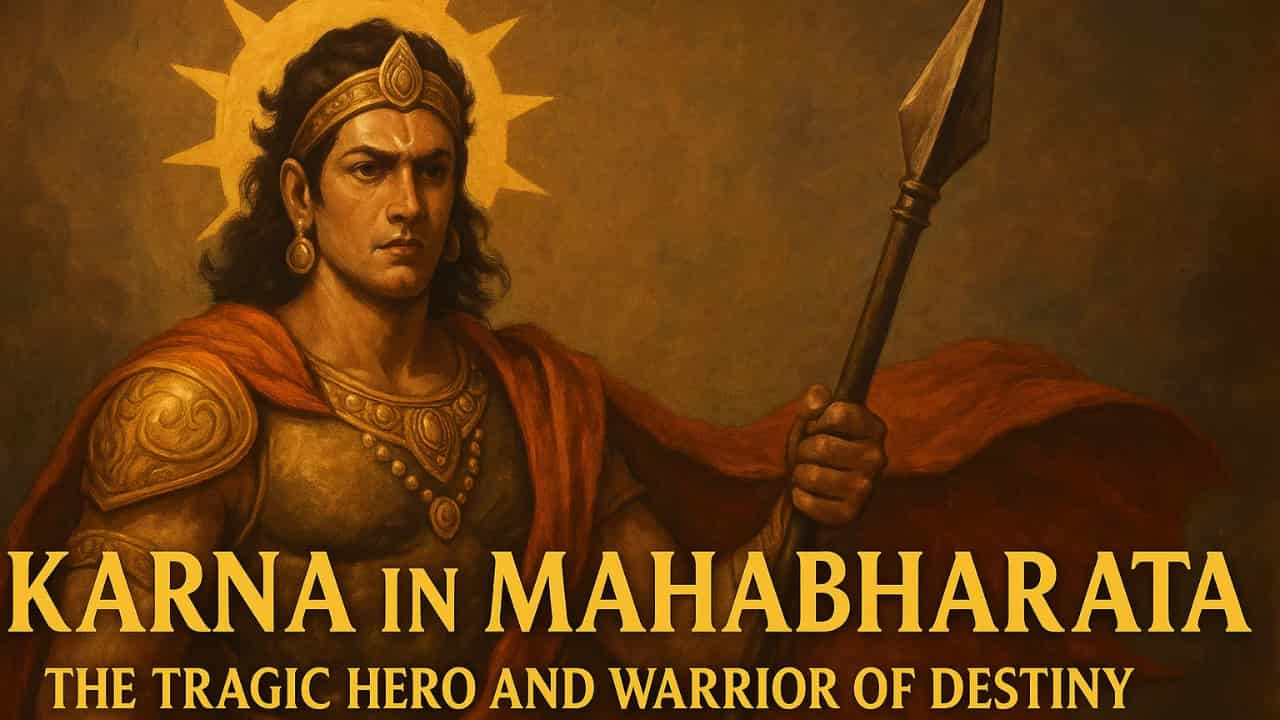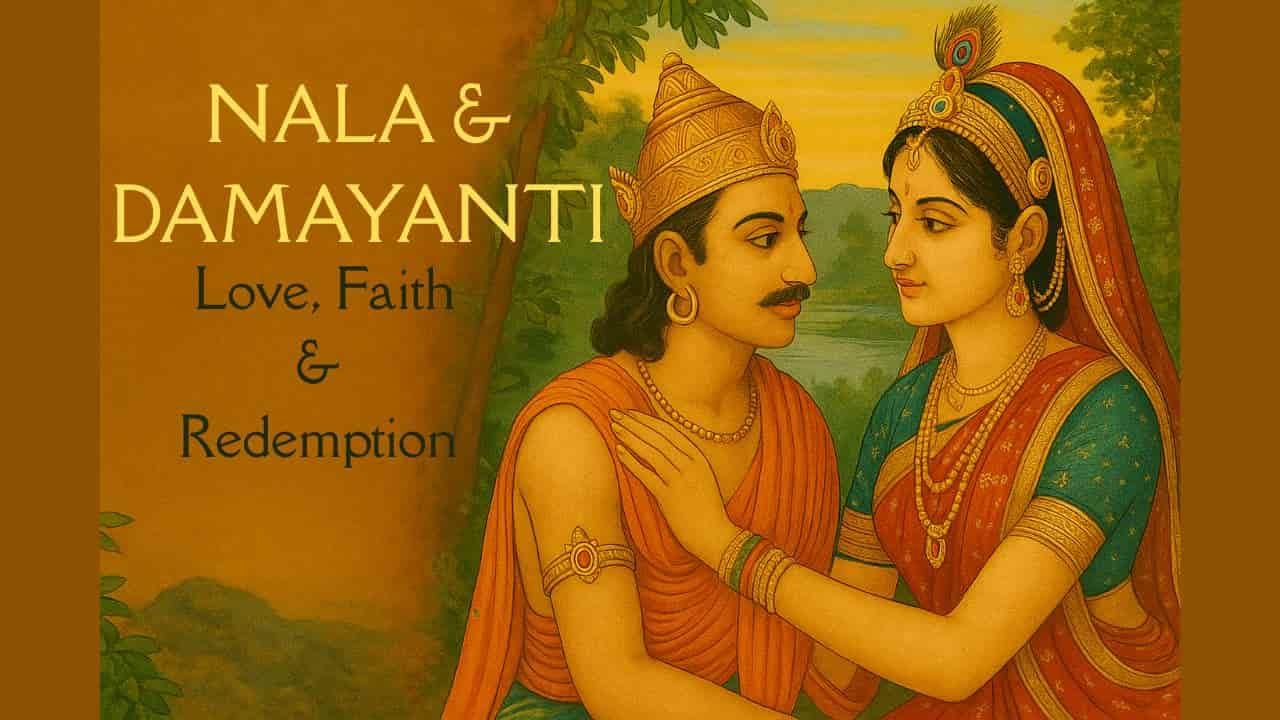A Hero Born in Shadows

Karna is one of the most compelling and tragic figures in Indian mythology. His life, as narrated in the Mahabharata, is a tale of courage, loyalty, injustice, and inner conflict.
Born with divine blessings yet raised in obscurity, his journey is marked by constant struggle between fate and choice, honor and rejection, greatness and grief. He is a warrior unmatched in skill, yet denied the respect he deserved. His story continues to resonate with readers across generations.
Divine Birth and Earthly Struggles
Before she was married, Kunti, the Pandavas’ mother, gave birth to him. Blessed by the sun god Surya, he came into the world with divine armor (kavacha) and earrings (kundala) that made him invincible.
Fearing social stigma, Kunti abandoned the newborn. Adhiratha, a charioteer, and his wife Radha found him and reared him. Though loved deeply, he grew up facing ridicule for his low birth, especially in a society obsessed with caste and lineage.
A Warrior Without a Name
Despite his humble upbringing, he showed extraordinary talent in archery and warfare. He aspired to learn from the best, Dronacharya, the royal teacher of the Pandavas and Kauravas.
But Drona refused to teach him, citing his caste. Undeterred, he approached Parashurama, a fierce warrior-sage known for training only Brahmins. Karna lied about his identity to gain entry. Parashurama accepted him and taught him the secrets of celestial weapons.
The Curse of Parashurama
Karna’s deception didn’t last forever. One day, while Parashurama rested on his lap, a scorpion stung him. Karna endured the pain silently, not wanting to disturb his guru.
Impressed by his endurance but suspicious of his strength, Parashurama realized Karna was not a Brahmin. Feeling betrayed, he cursed Karna, declaring that he would forget the knowledge of his weapons when he needed it most. This curse would later seal his fate on the battlefield.
Humiliation and the Rise of a Rival
His desire to prove himself led him to a public competition where the Pandavas displayed their martial skills. When Arjuna, the third Pandava, excelled in archery, Karna stepped forward to challenge him.
However, he was mocked and denied the chance to compete because of his low birth. Duryodhana, the prince of Hastinapura and Arjuna’s rival, saw Karna’s potential and immediately crowned him king of Anga. This act forged a lifelong bond between Karna and Duryodhana.
Loyalty to Duryodhana
His loyalty to Duryodhana was absolute. He stood by him through every conflict, even when Duryodhana’s actions were morally questionable. This loyalty was not blind; it was born out of gratitude.
Duryodhana was the only one who gave him respect and status when the world rejected him. He repaid that debt with unwavering support, even when it meant opposing his own brothers, the Pandavas.
The Dilemma of Identity
Karna’s life was shaped by a painful truth he didn’t know until much later. Just before the Kurukshetra war, Kunti revealed to Karna that he was her firstborn and the eldest Pandava. This revelation shattered him.
He was torn between his loyalty to Duryodhana and his newfound identity as a Pandava. Kunti begged him to switch sides, promising that her other sons would treat him as their elder brother. But he refused. He chose loyalty over blood.
The Gift of Armor and Earrings
Karna’s divine armor and earrings made him invincible. But Indra, Arjuna’s father and king of the gods, feared Karna’s power. Disguised as a Brahmin, Indra approached Karna and asked for his armor and earrings as alms.
Knowing the truth of Indra, he still gave them away, honoring the tradition of generosity. Indra, moved by Karna’s nobility, gave him the Vasavi Shakti, a powerful weapon that could kill any enemy, but could be used only once.
The Battlefield of Kurukshetra
He entered the war as Duryodhana’s greatest hope. He fought bravely, defeating many warriors and even injuring the mighty Bhima. His duel with Arjuna was one of the most anticipated moments of the war.
But fate intervened. During the battle, Karna’s chariot wheel got stuck in the mud. As he struggled to free it, he forgot the mantras to invoke his celestial weapons, just as Parashurama had cursed. Vulnerable and unarmed, he was killed by Arjuna.
Was Karna's Death Justified?
His death remains one of the most debated moments in the Mahabharata. Arjuna killed him while he was defenseless, violating the warrior code.
But Krishna, who guided Arjuna, argued that Karna had also broken rules by supporting the disrobing of Draupadi, by using unfair tactics against Abhimanyu, and by siding with adharma. His death was seen as karmic justice, though many still view it as a tragic injustice.
Karna's Character: A Study in Contrasts
Karna was a man of contradictions. He was generous to a fault, yet fought for a cause that led to destruction. He was noble in spirit, yet bound by loyalty to a flawed friend.
His life was a constant battle between what he was and what he could have been. He longed for recognition, yet chose sacrifice. He was denied love, yet gave it freely. These contrasts make him one of the most human characters in mythology.
Why Karna Still Resonates Today
His story continues to inspire and move people because it reflects real-life struggles. He represents:
- The pain of rejection
- The fight for identity
- The conflict between duty and desire
- The cost of loyalty
- The tragedy of missed opportunities
In a world where people are often judged by birth, status, or background, Karna’s journey reminds us of the importance of character, courage, and compassion.
Karna in Literature and Popular Culture
Karna has been the subject of countless retellings, poems, novels, and plays.
Writers like Shivaji Sawant (Mrityunjay) and poets like Rabindranath Tagore have explored his inner world with empathy and depth.
In modern media, Karna is often portrayed as a misunderstood hero, a man who deserved more than what fate allowed. His story is retold not just in India, but across cultures that value moral complexity and emotional depth.
Spiritual Interpretations of Karna’s Life
In spiritual discourse, he is seen as a soul caught between karma and dharma. His life teaches that:
- Truth is not always rewarded
- Loyalty can be both noble and destructive
- Greatness often comes with suffering
- Forgiveness and understanding are essential
His journey is a reminder that spiritual growth often involves pain, and that the path of righteousness is not always clear-cut.
The Eternal Tragic Hero
Karna’s life is a tapestry woven with courage, sacrifice, injustice, and grace. He was a warrior who never gave up, a friend who never betrayed, and a son who never received the love he deserved.
His story is not just about war; it’s about the human condition. He teaches us that greatness is not defined by victory, but by dignity in defeat. He reminds us that even in the face of rejection, one can choose honor.
In the end, he stands tall, not as a defeated warrior, but as a timeless symbol of resilience, loyalty, and tragic nobility. His legacy lives on in every heart that has ever felt misunderstood, every soul that has ever fought against odds, and every seeker who strives to rise above fate.

